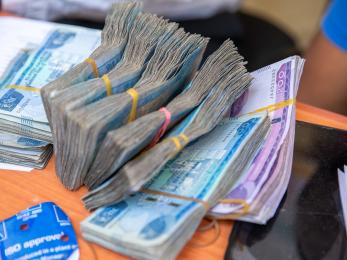Cheaper, Faster, Better? Cash Assistance in Emergencies

A case study of new technologies in cash transfers from the Democratic Republic of Congo
Over the past decade, there has been a growing consensus in the humanitarian community that cash, as compared to in-kind aid, is the best form of assistance to provide during an emergency. For families that have been displaced by a crisis or natural disaster, cash offers aid recipients more flexibility and the opportunity to prioritize their most urgent needs. With broad consensus that cash assistance can offer advantages over in-kind humanitarian aid, the debate now focuses on how best to deliver that cash.
To address this question, Mercy Corps undertook a nine-month study in the Democratic Republic of Congo (DRC), a country that has faced years of ongoing conflict, to determine which methods of distributing cash were most expedient and cost-effective. As part of the study, 3,355 individuals received assistance from Mercy Corps in the form of electronic vouchers (e-vouchers), mobile money or physical cash.
While previous research has been conducted to understand the cost efficiency of e-transfers, it has often relied on comparisons between programs operated by different organizations at different scales and in different contexts. Mercy Corps’ study provides an opportunity to directly compare the time and cost-efficiency of cash transfer mechanisms used in the same program during the same period.
The study report provides some surprising results. When measured by cost per transfer, electronic vouchers proved the most expensive way to deliver aid, mobile money was the next most expensive, and cash was the least expensive. In terms of expediency, mobile money in this instance proved to be the slowest method to get cash into people’s hands. Electronic vouchers and cash were quicker to deploy, and electronic vouchers could become even faster in subsequent deployments if global agreements with e-voucher providers and hardware were pre-positioned.
Read more about the study and findings as well as recommendations: Download the Report ▸
For humanitarian agencies looking to implement electronic cash transfer programs, whether e-voucher or mobile money, Mercy Corps has created a comprehensive guide to help with the decision-making process.
